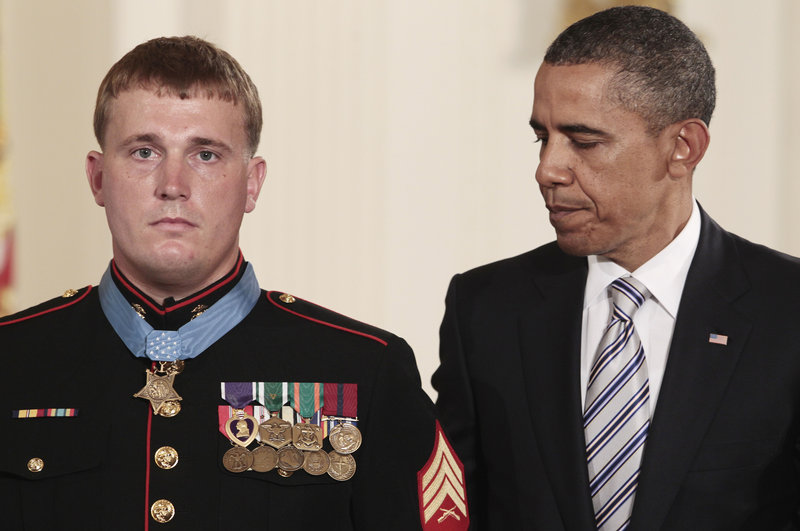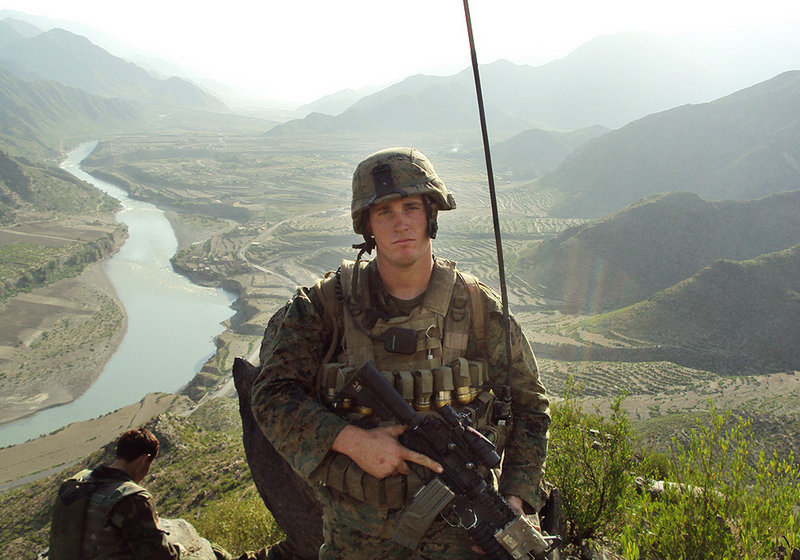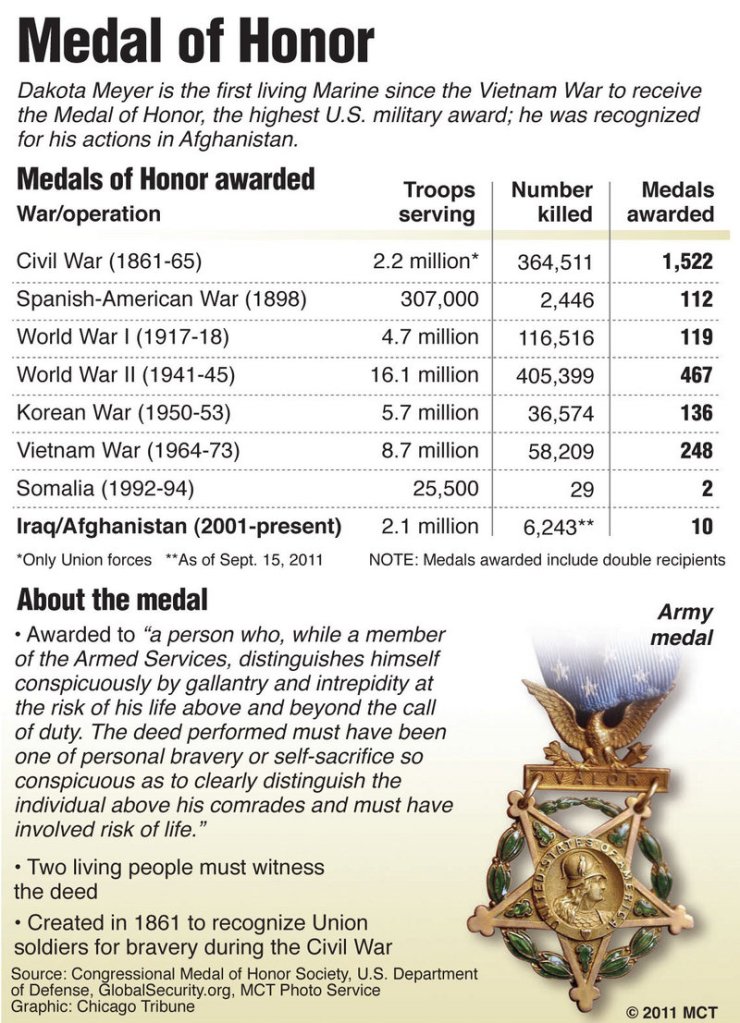WASHINGTON – The desperate call crackled over the radio in the predawn darkness: American and Afghan troops were pinned down in a remote village under withering fire from three sides. A young lieutenant was begging for artillery or air support. Without it, “we are going to die out here,” he yelled.
Can’t be done, came the reply. It might kill civilians.
Less than a mile away, Marine Cpl. Dakota L. Meyer heard the radio exchange in agony. His buddies were dying, yet Meyer was under orders to stay where he was. Four times he asked for permission to go to their aid, and four times over the two hours it had been denied.
Finally, Meyer, a powerfully built 21-year-old from Kentucky with a soft drawl, decided to defy his superiors. He climbed into the turret of a gun truck with a .50-caliber machine gun driven by another Marine and raced toward the battle.
On Thursday, Meyer was at the White House to receive the Medal of Honor, the nation’s highest award for valor, from President Obama for saving the lives of 13 U.S. and 23 Afghan combatants and personally killing at least eight Taliban on that day, Sept. 8, 2009. He is the first living Marine to receive the award since the Vietnam War.
Meyer stood at rigid attention in dress uniform while Obama recounted what happened that day in the village of Ganjigal.
“He drove straight into the line of fire with his head and upper body exposed,” Obama said, describing how Meyer and another Marine driving the Humvee went toward the sound of the guns. “They were defying orders, but they were doing what they thought was right.”
As Obama prepared to fasten the medal around his neck, Meyer stared toward the ceiling at the back of the room, as if recalling the events of that day two years ago, a day that Meyer calls the worst of his life.
“I’d rather have all my guys here now than receive the medal,” Meyer, now a construction worker back home in Kentucky, told CNN. He wears the names of four fallen colleagues he could not save engraved on a silver bracelet on his wrist.
Obama said Meyer initially refused to take his call about the award because he was working, saying, “If I don’t work I don’t get paid.” But at Meyer’s request, the president shared a beer with the former Marine on Wednesday evening outside the Oval Office.
Trained as a sniper, Meyer volunteered to go to Afghanistan in 2009 because he wanted to see action. His unit, the 3rd Battalion of the 3rd Marine Regiment based in Hawaii, was deploying to Iraq, but Meyer had already done a tour there two years earlier and found it too quiet for his taste.
In Afghanistan, he would be part of a sniper team assigned to a unit training Afghan forces in Kunar province, a remote and rugged area near the Pakistan border.
“The main reason I went is because I wanted to fight,” he later told the Marine Corps Times of his decision to volunteer for Afghanistan.
On the day of the ambush, four U.S. members of the training team accompanied two platoons of Afghan Army soldiers and border police to Ganjigal for what they thought was a meeting with village elders about providing assistance to help reconstruct a mosque.
As they entered the village near sunrise, all the lights went out and gunfire erupted as 50 insurgents in houses and in the hills above opened fire.
Meanwhile, once they decided to disobey orders to stay away, it took nearly 10 minutes for the gun truck driver, Staff Sgt. Juan Rodriguez-Chavez, to navigate down a steep, dry riverbed to the village of stone and mud houses at the far end of a valley.
They had driven straight into the “kill zone,” according to a Pentagon account of their actions. Bullets were bouncing off the vehicle.
Seeing Afghan soldiers lying on the ground, Meyer jumped out and began carrying the wounded to the vehicle as gunfire exploded around him, the account said.
After Meyer loaded five men, Rodriguez-Chavez turned the Humvee around and drove out of the village to a casualty collection point, where the wounded could be picked up by a medevac helicopter.
They switched to an undamaged Humvee and drove back to the village. Maneuvering in the riverbed, Rodriguez-Chavez called out at one point that they might get stuck. “I guess we’ll die with them,” Meyer called back from the Humvee turret, according to the Pentagon account.
Many of the Afghan soldiers were wounded, allowing the attackers to concentrate their fire on the vehicle carrying Meyer. On his third trip back to the village, he was wounded in the arm from a rocket-propelled grenade.
“Disregarding intense enemy fire now concentrated on their lone vehicle, Corporal Meyer killed a number of enemy fighters with the mounted machine guns and his rifle, some at near point blank range, as he and his driver made three solo trips into the ambush area,” Meyer’s official medal citation read.
But after four trips back and forth, they still had not found the four Marines. The sun was now up as Meyer decided to organize a fifth trip. This time he was joined by a Marine lieutenant and an Army captain, and a Blackhawk helicopter had arrived, several hours into the firefight, to provide overhead cover.
The helicopter crew informed Meyer that they had spotted what looked like four bodies in a ditch. Meyer ran to the spot and found the Americans, who were dead.
“Moving out of the ditch, across the danger zone, he transported the bodies” with the assistance of the two officers, the Pentagon account said.
Meyer, who left the Marines earlier this year, was distraught and furious in the days that followed, according to Bing West, author of “The Wrong War.” He was particularly upset over the operations center officers’ decision not to order artillery fire support.
“They’d be alive today if we got that fire support,” Meyer later told author West about the eight Afghan soldiers and five Americans who died in the eight-hour firefight.
When Meyer returned to his bunk the evening after the firefight, he learned that a stray dog he had adopted had been shot on the order of the commander to get rid of all pets on the base.
At the White House on Thursday, Meyer walked into the East Room with Obama and first lady Michelle Obama surrounded by 120 friends and family, including Marines and former Marines whom he had served with in Kunar province.
He stood speechless and stone-faced throughout most of Obama’s speech recounting his and Rodriguez-Chavez’s bravery. At Meyer’s insistence, ceremonies honoring his fallen comrades were held at the same time of his White House honor. Obama then lifted the gold star hanging from a blue ribbon over Meyer’s head and draped it around his neck, to the applause of the crowd.
Rodriguez-Chavez was awarded the Navy Cross, the nation’s second-highest medal for valor, last summer.
Send questions/comments to the editors.





Success. Please wait for the page to reload. If the page does not reload within 5 seconds, please refresh the page.
Enter your email and password to access comments.
Hi, to comment on stories you must . This profile is in addition to your subscription and website login.
Already have a commenting profile? .
Invalid username/password.
Please check your email to confirm and complete your registration.
Only subscribers are eligible to post comments. Please subscribe or login first for digital access. Here’s why.
Use the form below to reset your password. When you've submitted your account email, we will send an email with a reset code.